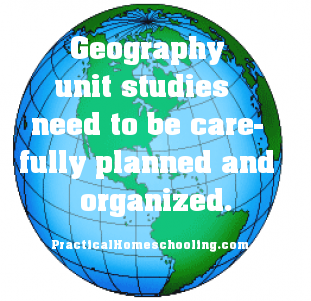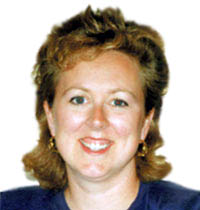How to Create Your Own Geography Unit
By Pam Maxey
Printed in Practical Homeschooling #47, 2002.
 How to create your own geography unit study.
How to create your own geography unit study.

 How to create your own geography unit study.
How to create your own geography unit study.

|
 |
 Making your own geography unit is a great way to supplement your current curriculum while adding some jazz to a subject students often find dry and forgettable.
Making your own geography unit is a great way to supplement your current curriculum while adding some jazz to a subject students often find dry and forgettable.
The first step in your missions or geography unit is to pick your main objectives. Your objectives can be different for each child. For a young child, your objectives could be as simple as wanting your child to learn the names of all 50 states and their capitals, to become familiar with the 7 continents, or to be able to locate your own state and some special features about your region. More complex objectives might involve picking a region to study in depth: its culture, its people, and its past.
Here are some other ideas for unit topics: a specific geographic region such as the mountains or prairie, a river system, or a specific country. If your kids are interested in sports, you could even have a unit where you look at favorite teams, where they are located, and something unique about each city where the college or team plays.
Your next step is to gather materials for your unit study. Your first stop should be the encyclopedia: either a print or computer version. Use its related articles index to take full advantage of the information. You'll also want an atlas and globe. For most locations, tourism websites are available to provide scenic pictures and lots of useful information. Ask your local librarian about books, tour books, biographies, and videos for your location.
With all your materials gathered, you are ready to begin planning. Decide what books to read aloud, which ones to have your children read, which books will simply be used for the pictures, and which videos are worth watching. Look for opportunities to include any crafts or other art projects. You may want to make a map of the region, draw or make native costumes, build a ship or home from the area, or plan a weekend trip to correlate with your unit. Again, make the unit as simple or complex as you wish. You don't have to go to elaborate lengths to teach a unit.
One way to kick off your geography unit is to study a specific person, such as an explorer or missionary. Use a biography of that person as the starting point for your unit. If you are beginning with a specific person for your unit, be sure to include how this person affected the region and how it has impacted the world. For example, you could watch the movie Chariots of Fire to begin a unit about China. The movie will give you a context for the background of the missionary (and Olympic athlete) Eric Liddell and his times. Then begin the study of China, the culture in which Eric Liddell served as a missionary, and where he died.
Now it's time to dig deeper. If your topic is a region, you can study its customs, foods, religions, plants, animals, native costumes, homes, and landforms. You can include the region's past and present culture in your study.
You can easily include activities with art and music from a region of study. Craft ideas could include making or drawing costumes or homes and making maps of the region.
A trip will really enhance your study. This will be easier if you choose to study a region close to home. For example, for my children a study of Missouri could include short trips to Ste. Genevieve or St. Joseph. "Sent Gen" as we pronounce it where I grew up, is the first settlement west of the Mississippi River. "St. Joe" is the home of the Pony Express. (Thank goodness for e-mail!) Both will include the history of the places, the differences in geography, and the differences in the people who settled the regions. Visiting Ste. Genevieve, for instance, allows you to walk the streets and see how small houses were in the little French village. The architecture is very unique and you can actually hear the mighty Mississippi just over the dike. There are also a number of museums available to view objects and photos from the past. We stayed in an inn that was over 100 years old. What fun!
Be careful not to let your study become too complex. This can happen if you focus too much energy towards a single topic. The objective of most unit studies is to increase your child's general knowledge of their world and increase their knowledge base. Keep your objectives in focus while you plan and study with your child. Find interesting items during your study along with the basic facts. Have fun exploring your region and enhancing your current curriculum. Use a geography or missions unit as a way to blend some objectives for history, reading, writing, and geography.
Keep it simple, keep it fun, and please make sure your children don't make it to high school thinking (as one public-school student actually wrote on his history test) "Christopher Columbus was a great navigator who discovered America while cursing about the Atlantic"! Happy sailing.
Some Websites I Use